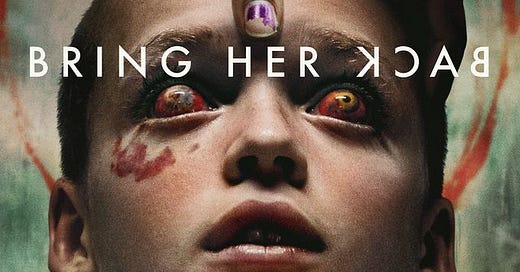‘Bring Her Back’ Review: ‘Lilo & Stitch’ for Sickos (Yes, That’s a Compliment)
Michael and Danny Philippou’s visually dazzling and unapologetically grim follow-up to ‘Talk to Me’ operates a post-breakout filmmaker-flex akin to ‘Unbreakable’ and ‘Us'
Bring Her Back
2025/104 minutes/rated R for… (deep breath) “strong disturbing bloody violent content, some grisly images, graphic nudity, underage drinking (that’s surely the dealbreaker) and language”
Directed by Danny Philippou and Michael Philippou
Written by Danny Philippou and Bill Hinzman
Produced by Samantha Jennings and Kristina Ceyton
Starring Billy Barratt, Sora Wong, Sally Hawkins, Sally-Anne Upton and Jonah Wren Phillips
Cinematography by Aaron McLisky, Edited by Geoff Lamb, Music composed by Cornel Wilczek
A film by Causeway Films and RackaRacka
Opening theatrically courtesy of A24 (domestically) and Stage 6 Films/Sony Pictures (overseas)
Michael and Danny Philippou have shown that Talk to Me was no fluke. Not that anyone should have expected that it was, but Bring Her Back is, above all else, what I like to call a “filmmaker flex.” Think M. Night Shyamalan following up The Sixth Sense with the bigger-scaled and more cinematically obtuse Unbreakable, and Jordan Peele following up Get Out with the more expensive, more expansive and borderline apocalyptic Us. Bring Her Back, which mostly takes place amid a single grim locale and primarily concerns a core trio, might qualify as “smaller” in scope than the slightly more crowded “high schoolers fuck around with the supernatural and find out” chiller Talk to Me. However, it never feels “small” and is packed to the brim with “Look what we can do!” flourishes.
My only “qualm” is that A) the film isn’t quite as unconventional or fantastical as the marketing might have suggested, and B) it’s not exactly filled with twists and turns. However, the dark fairy tale gets much of its mileage out of audiences wondering to what extent it’s going to deviate from the cards it has laid out upon the table. The set-up, as succinctly as possible, concerns newly orphaned kids Andy (Billy Barratt) and Piper (Sora Wong) who end up in the care of an awkward but kindly former social worker-turned-foster mother (Sally Hawkins). She is coping alongside her mostly mute son (Jonah Wren Phillips) with their own recent family trauma. Andy is about to turn 18, after which he has every intent of applying for custody of his legally blind younger sister.
Spoiler: Andy and Piper bond with their new caretakers and help Olivier come out of his shell. Andy gets the lead role in the school play and learns that he can support his sister while chasing his own dreams, while Piper receives a fashion makeover via montage. All parties learn a valuable lesson about the value of found family and emotional healing through mutual support. Okay, I might be lying about at least some of these plot developments. However, I’m 84% convinced that the legion of online folks raging at a painfully bad-faith interruption concerning the finale of Disney’s Lilo & Stitch remake saw this film by mistake. Remember kids, “Ohana” means family, and “family” means Oh sweet unholy mother of God!” Actually, “nobody gets left behind or forgotten” somewhat fits here too...?
If I’m bouncing around anything beyond the opening reel, it’s because it’s a film whose seemingly boilerplate synopsis gives away the whole game. That’s not a criticism, but I wish I had gone into the early screening knowing less about it. If by some miracle you haven’t seen much beyond the first teaser trailer, you won’t get much more from me. Just know that the film looks spectacular and delivers in terms of genuinely unnerving onscreen horrors and overtly unpleasant visual imagery. Yes, this is another horror film about grief and trauma, but this doesn’t hide behind buzzwords to excuse not offering up big screen-worthy goods alongside unapologetically unpleasant (and comparatively taboo) pay-offs. Nor does it feel the need to be subtle about its metaphors regarding the self-destructive nature of grief and loss.
With a sympathetic eye toward a traumatized generation seeking salvation in a world stripping away their ability to cope or even survive, Bring Her Back is a cinematic tour de force. I also appreciated how, being vague, the film is less concerned with spelling out its comparatively fantastical elements, as what is or isn’t real is mostly irrelevant to our core characters. The skewed perspective concerning Piper’s compromised vision and the circumstances surrounding Oliver’s misfortune allow for a gleeful playfulness, even while often emphasizing the sad over the scary for the sake of respecting its drama. That makes the whole enterprise more haunting and likely to stick with you than a popcorn-flying frightening approach. Bring Her Back may be among the most feel-bad movies of the summer, but it’s still a damn good movie.






Nods silent approval